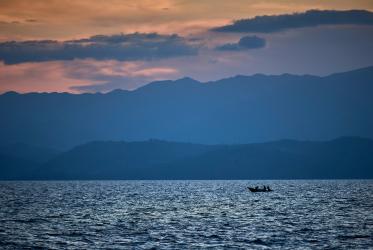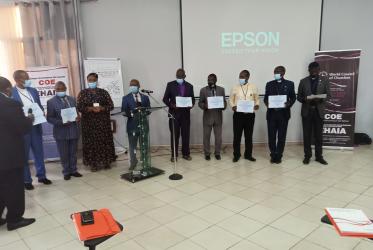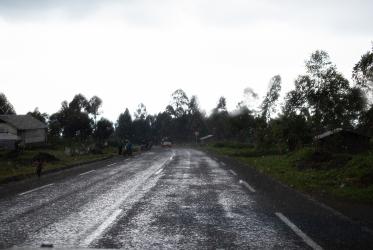Kirche Jesu Christi auf Erden durch seinen Boten Simon Kimbangu
(Eglise de Jésus Christ sur la Terre par Son Envoyé Spécial Simon Kimbangu)
After having received the mission and the authority from Jesus Christ to carry out a spiritual ministry that would emanate from Nkamba (Lower Congo, DRC) and spread out to the entire world, the Special Envoy Simon Kimbangu began his mission with the miraculous healing of a young woman, Maman Kiantondo, at Ngombe-Kinsuka, on 6 April 1921. The prophecies, healings and resurrections that followed were considered by the Belgian colonial authorities as a messianic movement that could destabilize the colonial fabric. Extreme repressive measures largely approved by the Catholic as well as Protestant missionaries were adopted by the colonial government against the "movement". The visible prophetic mission of Papa Simon Kimbangu only lasted five months. He was arrested at Nkamba, judged and sentenced to death on October 3, 1921 by a military court, after a parody of justice; the sentence was commuted into life imprisonment by King Albert 1 of Belgium. Papa Simon Kimbangu was deported to Elisabethville (now Lubumbashi), 2000 kms from his native village, where he died 30 years later, on October 12, 1951. Thirty-seven thousand families were deported between 1921 and 1951 for the same religious cause and their faith in Jesus Christ as Saviour through the work and teaching of his Special Envoy, Simon Kimbangu. The only result of these measures was to strengthen the movement which spread rapidly. On December 24, 1959 the Kimbanguist Church was finally recognized by the colonial power, on an equal basis with the Catholic and Protestant churches. It was led by the youngest son of Papa Simon Kimbangu, H.E. Joseph Diangienda Kuntima, spiritual chief and legal representative. As the supreme authority, the spiritual chief has under him a general assembly, a body in charge of the general policy of the church and an executive board.
Today the Kimbanguist Church is universal. It reaches out all over the world, in Africa, Europe and America. The church accepts the Nicene Creed. Kimbanguists believe in God the Father, creator of all that is, in Jesus Christ, only Son of God, Lord and Saviour of the human race, in God the Holy Spirit, comforter, instructor, inspirer and protector. Four sacraments are recognized: baptism, eucharist, marriage and ordination. Baptism and eucharist take place three times a year: on 6 April, 25 May and 12 October. The Kimbanguist doctrine is summarized in the trilogy "Bolingo, Mibeko, Misala" which means "Love, Commandments, Work". While the Kimbanguist Church is developing and transforming itself socially, materially and in terms of its universal outreach, it has preserved a very profound spiritual activity which is reflected in the rigorous observance of the commandments of pilgrimage to Nkamba, spiritual retreats, daily morning and evening prayers, intercessions for the sick, the afflicted, the populations of troubled countries and all humanity, hymns, biblical meditation, fasting and confession of sins.
Since the death of H.E. Papa Dialungana Kiangani, spiritual chief and legal representative, who passed away on 16 August 2001, the Kimbanguist Church is led by H.E. Simon Kimbangu Kiangani.
Last updated: 1.1.2006




